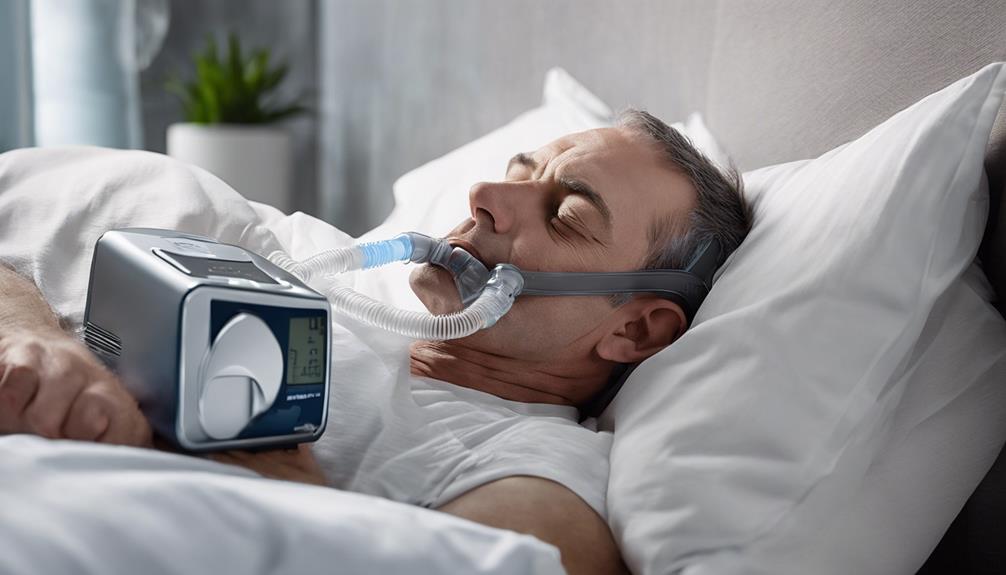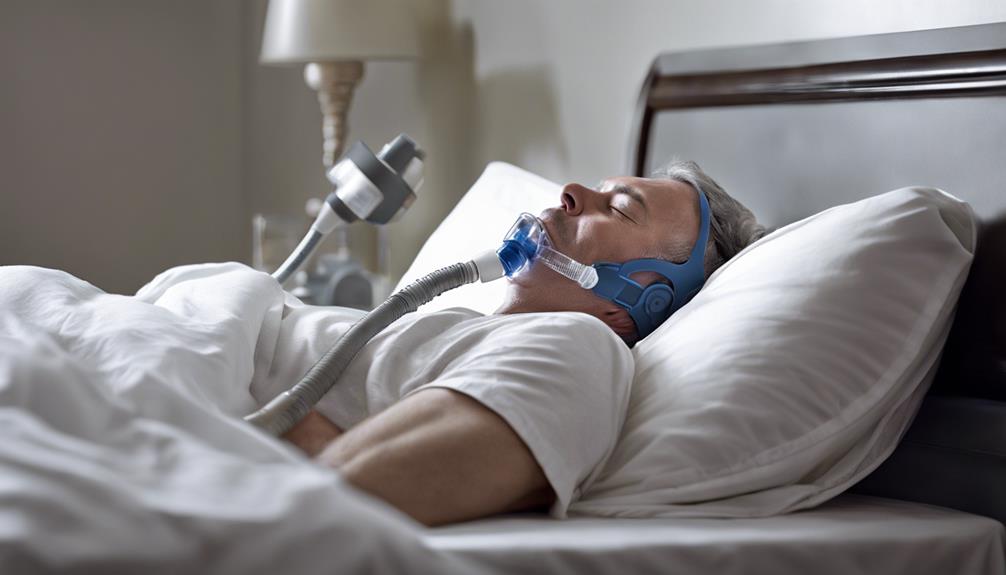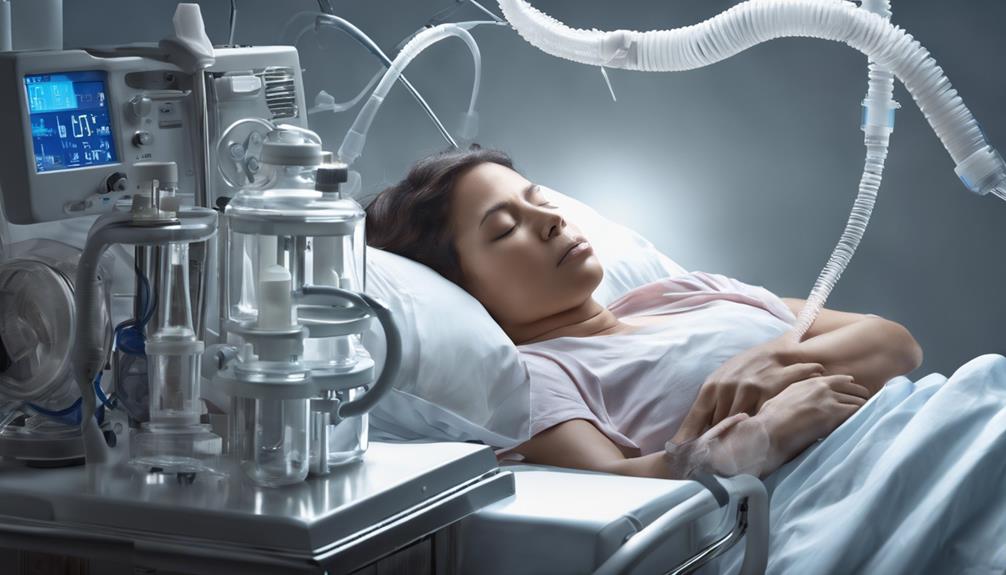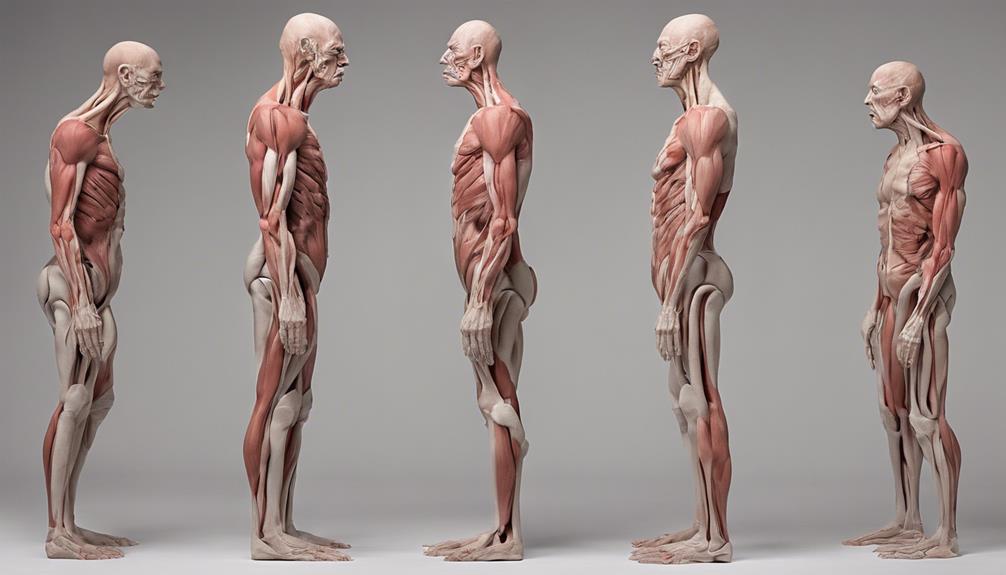Untreated sleep apnea increases the chances of heart disease, stroke, and death. It is crucial to address this issue promptly for our overall health. Compliance with CPAP therapy is key in reducing the risk of mortality. It is important to have regular monitoring and follow-up care for effective treatment. Severe untreated sleep apnea significantly raises the risk of mortality. Implementing strategies such as lifestyle changes and timely diagnosis can help in managing sleep apnea and protecting against mortality risks. Understanding these factors is essential to safeguard our health.
Key Takeaways
- CPAP therapy compliance reduces mortality risk.
- Regular monitoring and follow-up care are vital.
- Lifestyle changes like weight loss and alcohol avoidance help.
- Timely diagnosis and treatment are crucial.
- Untreated sleep apnea increases mortality rates.
Risks of Untreated Sleep Apnea
Experiencing untreated sleep apnea significantly increases the risk of severe health complications, including heart disease and stroke. Untreated sleep apnea is a serious condition where breathing repeatedly stops and starts during sleep, leading to oxygen deprivation and potential harm to the body. This lack of oxygen causes hypoxia, which can elevate the chances of developing cardiovascular issues and ultimately mortality.
Individuals with untreated sleep apnea face a higher risk of heart disease, stroke, and even premature death. Research shows that there are approximately 38,000 annual deaths in the US attributed to heart disease worsened by untreated sleep apnea. Additionally, the risk of experiencing a stroke is two to three times higher in individuals with untreated sleep apnea compared to those without the condition.
It's important to address sleep apnea promptly to reduce these risks and improve overall health outcomes.
Importance of CPAP Therapy Compliance

Compliance with CPAP therapy is essential for reducing mortality risk in individuals with sleep apnea. To highlight the importance of CPAP therapy compliance, consider the following key points:
- Reduced Mortality Risk: Regular and consistent use of CPAP can greatly lower the risk of cardiovascular mortality in individuals with sleep apnea.
- Prevention of Complications: Proper adherence to CPAP treatment is critical for preventing complications and improving overall health outcomes.
- Risk of Sudden Death: Non-compliance with CPAP therapy may increase the chances of sudden death and other serious health issues associated with sleep apnea.
- Improved Health: Studies show that proper CPAP therapy compliance plays a crucial role in reducing mortality rates linked to untreated sleep apnea.
Monitoring and Follow-Up Care
Regular monitoring and follow-up care are vital elements in the all-encompassing management of sleep apnea. They ensure treatment effectiveness and patient adherence. Follow-up care helps healthcare providers track progress, adjust treatment plans, and address any emerging issues promptly. By scheduling consistent follow-up appointments, complications can be prevented, and overall health outcomes improved.
Monitoring plays an essential role in reducing mortality risk associated with untreated sleep apnea. It allows for the early detection of any potential problems, leading to timely interventions. Patients benefit greatly from this ongoing support, which enhances their quality of life and well-being. Additionally, integrating tools like bed and chair alarm effectiveness into monitoring systems can further ensure patient safety, especially for individuals at risk of falls or other complications during sleep. These alarms provide an added layer of precaution, helping caregivers respond promptly to any unusual activity. Together, these measures work to promote better health outcomes and a more secure environment.
Link Between Sleep Apnea and Mortality

The correlation between sleep apnea and mortality risk is a significant concern that necessitates attention for effective management and improved health outcomes. Understanding the impact of sleep apnea on mortality can help individuals take proactive steps towards better health. Here are some key points to bear in mind:
- Severe sleep apnea increases mortality risk by three times compared to individuals without sleep apnea.
- Untreated sleep apnea further raises the risk of death, highlighting the importance of timely intervention.
- The hazard ratio for all-cause mortality is 4.3 for individuals with severe sleep apnea who don't undergo CPAP treatment.
- Men and women with undiagnosed sleep apnea tend to have poorer survival rates, emphasizing the need for awareness and screening even in the general population.
Strategies for Managing Sleep Apnea
Understanding the impact of CPAP therapy and lifestyle changes on managing sleep apnea is important for reducing mortality risks associated with the condition. CPAP therapy has been shown to greatly decrease death rates in sleep apnea patients. However, to reap the benefits, compliance with the treatment is essential.
Regular monitoring and follow-up care are necessary to guarantee effective management of sleep apnea and lower the risk of mortality. Lifestyle modifications, such as weight loss and avoiding alcohol, can complement CPAP therapy, improving outcomes and reducing the chances of death from sleep apnea.
Timely diagnosis and appropriate treatment are key strategies in protecting against mortality risks linked with the condition. By incorporating these strategies into a thorough plan, individuals can effectively manage sleep apnea, enhance their quality of life, and reduce the threat of mortality.
Frequently Asked Questions
What Is the Life Expectancy of Someone With Sleep Apnea?
We want to stress the importance of early detection and treatment for sleep apnea. Those with untreated severe sleep apnea face a greatly reduced life expectancy. CPAP therapy can potentially improve life expectancy by reducing risks associated with sleep apnea.
Will a CPAP Machine Extend My Life?
Using a CPAP machine can extend life by reducing risks associated with sleep apnea. Compliance with therapy is key. It helps maintain open airways, preventing pauses that can be life-threatening. Regular monitoring improves outcomes.
Does CPAP Restore Life Expectancy?
Yes, CPAP therapy restores life expectancy by improving oxygen levels and reducing cardiovascular risks. Regular use of a CPAP machine helps prevent sudden cardiac death and enhances overall health outcomes. CPAP treatment plays an important role in extending life expectancy for individuals with sleep apnea.
What Is the Most Common Cause of Death in Sleep Apnea?
The most common cause of death in sleep apnea is cardiovascular mortality. Patients with severe sleep apnea are at a higher risk of dying from cardiovascular diseases. Untreated sleep apnea can lead to sudden cardiac death.
Conclusion
To sum up, taking steps to manage sleep apnea is like building a sturdy roof over your health. By addressing the risks, complying with CPAP therapy, and staying on top of monitoring and follow-up care, you can prevent the storm of mortality from striking.
With the right strategies in place, you can protect yourself and enjoy a restful night's sleep for years to come. Stay informed, stay proactive, and stay healthy. Your well-being depends on it.









